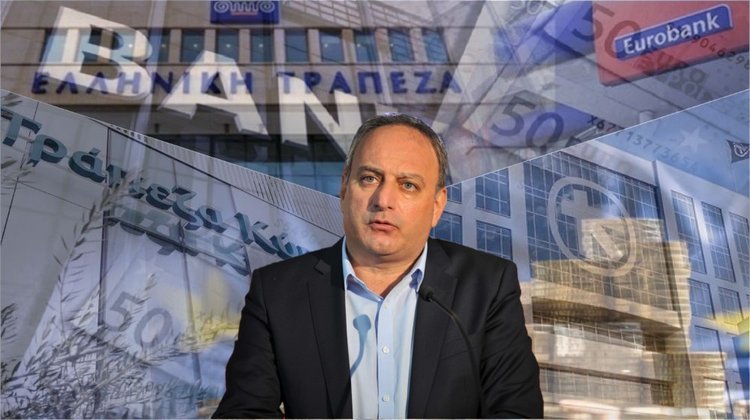The banking sector’s growth trajectory and how AKEL is trying to stop it
07:50 - 04 December 2024

Just about a week ago, the Moody's rating agency, proceeding with a double upgrade, classified Cyprus in investment grade A after 13 years, resoundingly confirming the stable, upward trajectory of the Cypriot economy.
The upgrade by Moody's came in the wake of a series of upgrades that have already taken place over the past two years, with the President of the Republic, Nikos Christodoulides, from the podium of the 11th KEBE Business Leader Awards, proclaiming that this is a development that paves the way for significant prospects, going on to prioritise the attraction of quality investments as the first of these prospects.
A few days later, speaking in the context of the second Cyprus-Greece intergovernmental summit, Nikos Christodoulides, flanked by Greek Prime Minister Kyriakos Mitsotakis, indicated that “the largest investment in Cyprus was recently made by Greece, with over one billion euros.” He was referring to the investment of over €1.2 billion made by Eurobank S.A. in Hellenic Bank.
All of the above extremely important events are recorded as actions that undoubtedly reflect the overall auspicious prospects of the Cypriot economy. They also demonstrate the vote of confidence it is receiving from abroad, confirming the country’s development into an attractive investment destination. But, the following paradox has been observed:
Within the borders and specifically within the Cypriot Parliament, with AKEL in a negative leading role, an attempt is being made at all costs to halt the development trajectory into which an important pillar of our island's economy, the financial sector, appears to have entered for good.
At a time when, for example, Eurobank is investing in Hellenic Bank and pouring billions of cash into the Cypriot economy, at a time when the Bank of Cyprus is constantly attracting new important investors from abroad to its share capital, but also at a time when Alpha Bank - implementing a development plan - is focusing on its further expansion in the Cypriot market, AKEL's concern was and remains what it calls "temporary taxation of the banks' excess (windfall) profits."
This is something on which the Government, Ministry of Finance, Central Bank and other economic actors have repeatedly expressed their disagreement, not incidentally, but because such taxation will not serve any purpose and because on the contrary it will only bring about harmful results to our economy and the financial sector.
However, insisting, alone, on its position on taxing the "excess profits" of banks, AKEL proceeded a few days ago to submit amendments to the bill it had put forward, in a last-ditch effort to secure the required parliamentary majority that would allow it to be voted on by the Plenary.
The aim, as stated by the party's General Secretary, Stefanos Stefanou, is for this to happen before the end of the year and before Parliament closes for the Christmas and New Year holidays.
This effort by AKEL unfortunately confirms once again its obsessive approach, which we discussed above, as it also confirms its long-term philosophy, which demonising profit and which considers private initiative to be anathema.
We have written in the past that we would not expect - although we would hope for- anything different from a party the ideological and political anchorages of which consists of an incurable disease; we would not expect, although we would hope, that AKEL - even at the last moment – will revise its perceptions on the issue and behave in a mature and responsible manner.
However, we are investing, at the risk that the word "invest" we are using will be misunderstood by AKEL, in those political forces in Parliament that are able to perceive the dangers that AKEL's proposed law entails. We invest in its being voted down by those parties - whether in coalition or opposition - that do not suffer from obsessions and do not suffer from the syndromes that have long ceased to exist in the sphere of political life in almost all of Europe.
If, through the alchemy with which AKEL is attempting to pass its proposal, it succeeds, the parties that vote for it will be equally accountable, they will be equally responsible for the fact that they will have put their signature on a law, which is nothing more than an unprecedented setback in the development path of Cyprus' financial sector, and of course its economy.
Quite simply, this is because such a development would send the very wrong message to foreign investors who have already invested in our country or who could invest in Cyprus in the future that the tax or legal regime can be changed up regularly and depending on political expediency.
Quite simply, because it would be a stab in the back of vitally important parametres, such as the stability of the legal framework and the friendly business-investment environment on the island.
In other words, elements the continued existence of which, without asterisks and footnotes, as AKEL would say when talking about banks, constitute a basic condition for both the country and our financial institutions to continue receiving positive ratings. And, elements that constitute key ingredients for a favorable environment for attracting foreign direct investment and for the liberation of the development prospects that are emerging.
(Source: InBusinessNews)

